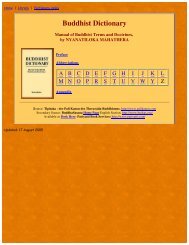Night and Morning with Bhikkhu Tissa
Night and Morning with Bhikkhu Tissa
Night and Morning with Bhikkhu Tissa
- No tags were found...
You also want an ePaper? Increase the reach of your titles
YUMPU automatically turns print PDFs into web optimized ePapers that Google loves.
<strong>Bhikkhu</strong> <strong>Tissa</strong>: Nibbána is known in two ways. The arahant, the perfected one, achieves liberatingknowledge, realizes Nibbána in the present life, <strong>and</strong> he continues to live out his lifespan. The five aggregatesof his personality—material form, feelings, perceptions, mental formations, <strong>and</strong> consciousness—continue tofunction <strong>with</strong> the remaining impetus of past kamma, but he has completely ab<strong>and</strong>oned the craving that wouldlead him on to another rebirth. As long as his body lasts he continues to live, <strong>and</strong> his senses continue tooperate, but there is no more greed, hatred, or delusion whatever in him. This is the first aspect of Nibbána.Then, at the destruction of the body, he is liberated entirely. This is the aspect of Nibbána <strong>with</strong>out anyremainder left.Gene: I guess you know what I want to ask next. What happens to an arahant, a fully enlightened person,after death?<strong>Bhikkhu</strong> <strong>Tissa</strong>: That, Gene, is beyond the limits of language <strong>and</strong> concept. Such a person escapes from birth<strong>and</strong> death <strong>and</strong> all categories of thought. He is completely released, liberated from all suffering.Gene: Still, that sounds good. It sounds like the ultimate happiness, even if no one can exactly describe thestate in mundane language.<strong>Bhikkhu</strong> <strong>Tissa</strong>: When the Buddha went forth from home into homelessness he was looking for what hecalled the “unborn, unaging, unailing, deathless, sorrowless, undefiled supreme surcease of bondage,Nibbána.” And that is what he found at last. Also, even though language is inadequate, the Buddha didoutline Nibbána in positive terms, too, referring to it as the wonderful, the marvelous, purity, freedom, theisl<strong>and</strong>, the shelter—<strong>and</strong> more. But the most he could do for those not yet enlightened was to inspire them <strong>with</strong>an ideal <strong>and</strong> to explain how they might reach the ideal themselves.Gene: Buddhism is certainly a way of action, not just of contemplation.<strong>Bhikkhu</strong> <strong>Tissa</strong>: The attainment of Nibbána is the highest thing possible. And when we consider the depthsof dukkha, it seems even more marvelous.Gene: How do you mean?<strong>Bhikkhu</strong> <strong>Tissa</strong>: As we discussed last night, suffering is not simply these familiar, obvious pains of mind<strong>and</strong> body, but also the unthinkably vast, beginningless cycle of saísára, which is unsteady, afflicted,unreliable, insecure, <strong>and</strong> endlessly deceptive. Out of that the Buddha <strong>and</strong> the noble ones after him made theirheroic climb to ultimate deliverance. The Buddha said that all is burning <strong>with</strong> the fires of lust, hate, <strong>and</strong>delusion—burning <strong>with</strong> the many forms of suffering. Nibbána is the putting out of those terrible fires; it is thecooling of fever, the calming of all trembling, the purest peace, the absolute end of all suffering.Gene: Even though language is inadequate, it certainly can suggest a great wonder here.<strong>Bhikkhu</strong> <strong>Tissa</strong>: There are two things in particular it would be good to keep in mind: Nibbána iswonderful, <strong>and</strong> it can be reached. If it were totally inaccessible, or if language <strong>and</strong> teaching were useless, thenthe Buddha would not have taught at all. But, knowing what he did know, he taught. He roused his disciplesto make an effort to attain the highest.Gene: That involves a great effort, surely.<strong>Bhikkhu</strong> <strong>Tissa</strong>: Of course. It’s by no means easy. The habits of craving we have formed through so manyaeons in saísára are very tenacious, but they can be broken.Gene: So one who strives <strong>and</strong> removes all craving in himself naturally reaches Nibbána?<strong>Bhikkhu</strong> <strong>Tissa</strong>: Yes, but one has to go about this in the right way. Even a superhuman effort won’t resultin liberation if it’s wrongly directed.Gene: What if somebody doesn’t believe in liberation or Nibbána but just tries to live a virtuous, noble life?<strong>Bhikkhu</strong> <strong>Tissa</strong>: Saísára keeps on going according to actions whether or not anyone is aware of them orapproves of them. Good actions bring good results <strong>and</strong> bad actions bring bad results, on <strong>and</strong> on, in the naturalorder of things. The person who acts virtuously will experience the effects of his good deeds; he directshimself toward a happy life in the future. This is an important teaching in Buddhism. But still we mustremember that all worldly states—even the most tranquil <strong>and</strong> beautiful—are impermanent. Even rebirth in thehigher, delightful planes of existence is only temporary. If one’s craving continues then the sequence of birth<strong>and</strong> death <strong>and</strong> further dukkha will continue.15
















